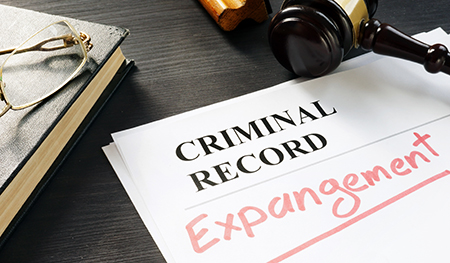
During life people all make mistakes or errors in judgement. Some of these errors can have lasting impact on our lives going further, especially those instances which result in a criminal record. An individual may want to move beyond this past history and seek to clean up their criminal record. There could be several reasons for doing this including seeking employment, trying to find a place to live, or potentially restore lost rights, like the right to own a firearm. There are three primary ways to resolve your criminal history discussed below.
To expunge means to physically destroy the records or return them to the petitioner and to obliterate the petitioner’s name from any official index, or public record, or both. Essentially, expungement means to erase your criminal history. Previously, the law in Illinois did not allow for individuals to apply for expungement if they had even one prior criminal conviction on their record. However, changes to the law now allow an individual to petition for the expungement of all eligible offenses, even if that individual has a prior conviction in their history. To be able to expunge requires a disposition of the following: (i) acquittal, dismissal, or the petitioner’s release without charging; (ii) a conviction which was vacated or reversed; (iii) an order of supervision and such supervision was successfully completed by the petitioner (with some exceptions); or (iv) an order of qualified probation and such probation was successfully completed by the petitioner. It should be noted that some charges, even with the above dispositions are not eligible for expungement. Additionally, the law establishes a time period for when a charge is eligible for expungement. We recommend you contact our office and consult with an attorney regarding expungement and your specific circumstances. As of January 1, 2020, also includes convictions for low level marijuana charges.
Many criminal charges that are not eligible for expungement are allowed to be sealed. Sealing means to physically and electronically maintain the records, unless the records would otherwise be destroyed, but to make the records unavailable without a court order. Essentially, this means that an order to seal would protect a petitioner’s criminal history and restrict who has access to the records. The information would be available to law enforcement and the courts, but the record is hidden from the general public. Sealing is available for many non-violent misdemeanors and specific Class 3 and Class 4 felony charges. As with expungement, there may be necessary time periods a petitioner must wait before their charges are eligible to seal.
This is more commonly referred to as a Pardon from the Governor. Petitioner’s file a request for clemency with the Petitioner review board. This process is complex. Part of the process will be to obtain information from arresting agencies and the state police I order to provide a comprehensive criminal history to the Prisoner review board (PRB). It will also need to provide a personal statement detailing certain information about each arrest, and a explanation of the hardship the Petitioner is enduring as a result of their criminal history. Petitioner’s will need to include letters of recommendation to submit with their application. Once the application is complete, it will be submitted for the prisoner review board the petitioner will have the option to request an in-person hearing. Subsequently, the board will make a confidential recommendation to the Governor for their final decision. It should be noted that Executive clemency is not a legal process, rather a political power that the Governor can choose to exercise or refuse to exercise for whatever reason they deem fit. There is no appeal for a denial, and the Petitioner must wait a year before they can re-apply. Upon the Governor’s granting of clemency, the process is still not complete. The Petitioner still must petition the courts for expungement of their charges. It should be noted that Executive Clemency may also restore an individual’s right to possess firearms.
In short, there are many reasons to want to clean up criminal history and several avenues available to accomplish this. The proper avenue depends on what the overall goal is. If you are interested, please feel free to contact our office to speak with an attorney regarding the choice which may be best for you.
